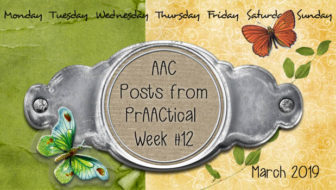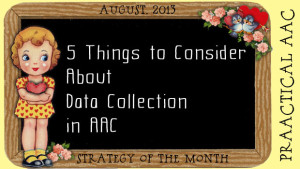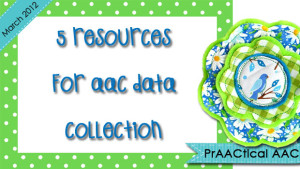March 24, 2019
by Carole Zangari -

Happy Sunday, AAC friends! Here’s what we’ve been up to. Monday – PrAACtical Resources: Communication with Children with Deafblindness or Visual and Multiple Impairments Tuesday – AAC Link Up Wednesday – Video of the Week: AAC (Re)Boot Camp-It’s Not About the Technology Thursday – Using Generalization Probes to Gauge Language Learning in AAC :::::::::::::::::::::::::::::::::::::::::::::::::::::::::::::::::::::::::::::::::::::::::::::::::: We’ve been talking about AAC and book reading with some prAACtical friends this week. It seemed like a good time to share some book-related posts from the archives. 5 Ways to Use Books to Build Interaction with AAC Learners Alphabet Books and AAC Implementation Adapting Books with Visual Scenes Make It PrAACtical: Display Stand for Visual Supports or Books Using Adapted Books with AAC Learners: 3 Important Questions to Ask
Filed under: Featured Posts, PrAACtical Thinking
Tagged With: assessment, Books, data, data collection, deafblind
August 22, 2013
by Carole Zangari -

As a rule, SLPs are pretty good about collecting data in their clinical work. Here are some of our prAACtical thoughts about data collection. 1. Don’t bite off more than you can chew. We’ve visited several programs where the client data filled a huge 3-ring binder. In some places, they logged the data daily, reviewed it frequently, and actually USED it to make programmatic decisions. If that works for you, great! But most programs only reviewed the data when they had to report it or prior to a visit by someone who might want to see and discuss those data. In those cases, the data really wasn’t serving it’s original purpose: to see how instruction might need to be tweaked for a client who was learning quickly, slowly, or not at all. The takeaway: Don’t collect more data than you’re prepared to review and put to use. 2. We should... [Read More...]
Filed under: PrAACtical Thinking
Tagged With: assessment, data, data-based decisions, download, forms
December 7, 2012
by Carole Zangari -

Last month, we talked a lot about semantic intervention with people who are learning AAC. Once we got started, we realized we could have done another whole month on the topic, but we had to move on. We ran out of time before we could really talk about outcome measures. As clinicians, how do we determine whether our therapy is effective? Here are some things to do after you’ve provided high-quality, well-sequenced vocabulary instruction. Make small comprehension checks a regular part of your instruction. Ask the AAC learner to tell you about ___ . Then score their response as objectively as possible (e.g., complete & correct, correct but incomplete, vague, incorrect). You’ll get some real-time feedback and can clarify or re-teach as necessary. Assess in a standardized fashion. Standardized means doing something the same way each time. Set up appropriate assessment tasks that allow you to judge how well the... [Read More...]
Filed under: PrAACtical Thinking
Tagged With: assessment, data, data-based decisions, semantics, vocabulary
March 15, 2012
by Carole Zangari -

We’re big fans of AAC devices and apps that help with data collection. When used with appropriate attention to confidentiality issues (e.g., client consent, etc.) they can help SLPs gather data on how language is used under real-world conditions. When the data are interpreted skillfully, these are wonderful clinical resources that can help us adjust our intervention plans to accelerate learning. – Many times, however, we’re also looking for data collection tools that are separate from the AAC tool itself. – Here are some ideas for forms and tools for collecting data that help us plan better intervention. – 1. The book How Do You Know It? How Can You Show It? Making Assistive Technology Decisions (Reed, Bowser, & Korsten, 2002) has a good overview of concepts in data collection in AT and helpful forms. You can get a PDF of that book here. 2. The blog Teaching Learners... [Read More...]
Filed under: PrAACtical Thinking
Tagged With: data, resources



